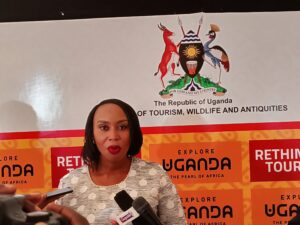The Uganda Tourism Board (UTB) has said it is closely working with the Ugandan Missions abroad to market the country, and attract more arrivals.

The UTB Marketing Manager, Claire Mugabi made the revelation at the event held in Kampala on Tuesday to commemorate World Tourism Day.
“We are working very closely with our Embassies, our Missions abroad to become tourism destination marketing touch points for the country. We have equipped them with information about the country so that if anyone walks into any Embassy or High Commission for Uganda in any country, it is the first place, the touch points you get information pertaining to where to travel, how to travel to Uganda, how to get there, costs of travel. So we are working very closely with those embassies,” she said.
This is among many other strategies that UTB is deploying to revamp Uganda’s tourism industry which was heavily affected by the COVID-19 pandemic.
Uganda boasts of unique natural, cultural and historical attractions in the world. For example, 54% of the Mountain gorillas in the world are found in Uganda.
Apart from the Big Five; lion, leopard, giraffe, elephant and giraffe, travellers track and habituate the mountain gorillas and chimpanzees.
With that, Uganda positions itself as the key destination for maintain gorillas.
Uganda is a home for 1,090 bird species, which is 50% of the bird species in Africa.
Further, Uganda has more primates species than any other country in the East African Community region and Europe, and is home to the source of the Nile, the world’s longest river.
Tourism is one of the fastest growing sectors in Uganda. The sector earned the country over USD$1.6 billion in 2018 compared to USD$1.45 in 2017, accounting for 7.7% of the national GDP.
However, the outbreak of COVID-19 which caused shutdown of air travel allover the world caused a huge drop of arrivals in Uganda.
To get back on track Uganda is rethinking it’s tourism, and according to Mrs Mugabi, UTB is also working with the national carrier to market Uganda abroad.
“We are working very closely with our national carrier, the Uganda Airlines to promote arrival to Uganda. One of the key parameters that is very important on the competitive index of destinations is connectivity. The easier it is to connect to a destination, the easier it will become for people to come to the destination. So, with national Airline, it has become very easy for people and more affordable of course to connect Uganda from Kenya, from the different routes that they are flying. So, we conduct various activations with Uganda airlines to activate the different markets, tell them about the different destinations they can fly to when they come to Uganda, and also to run promotions in the airlines. We are also doing a bit of in flight advertising. While flying on the Uganda Airlines, I believe you can see from the food that they’re serving, the way they are dressed, it is Ugandan. They are running videos about the different products that you have as a country. So we’re working very closely with them,” she said.
The World Tourism Day is celebrated at a time when Uganda is hit by the Ebola disease, which could cut the number of arrivals in the country.
Uganda’s tourism industry being government led, but private sector driven, Mrs Mugabi said UTB has mapped out different stakeholder categories to work with in an effort to grow country’s tourism.
“One of them is the private sector. Those are the people that sell tourism. They are the ones that own accommodation facilities. So, we are working more collaboratively with them. We are building their capacity in terms of customer service, to make sure that they deliver on our promise of Uganda being the Pearl of Africa,” she said.
The Minister of Agriculture, Animal Industry and Fisheries, Frank Tumwebaze who was a keynote speaker at the event said tourism should not be treated as an isolated sector for a few players and stakeholders, noting that it for every Ugandan.
“It is a sector that if it wins, everybody wins. More tourism numbers in the country mean what? They mean more eggs eaten and sold, they mean more poultry birds slaughtered for the lodges and hotels, they mean more jobs for the car drivers, the taxi operators and tour operators, they mean more jobs in terms of markets for our agricultural produce. So, tourism is an enabler, it is one guarantor of expanding and sustaining domestic market for most goods and services,” he said.
“It is therefore not the responsibility alone of the Ministry of Tourism and UTB to promote our country. Where will I sell my agricultural products if I do not work with tourism, to have an expanded internal market? If all the lodges in Uganda, in our parks in our urban centers were experiencing an average of 50% to 60% occupancy, I would not need any regional or international market to take our eggs. Our eggs would sustainably be absorbed here in the market,” he added.
To some officials in certain sectors who solely concentrate on promoting their respective sectors, Tumwebaze said, “we are interlinked,” and called for the formation of multi sectoral tourism forum to promote Uganda’s tourism industry.
“I call for the formation of a sector wide Forum for tourism where all of us come in, because we have interest. Just like you have heard of a Forum called JLOS (Justice Law and Order Sector). Judiciary is there, Internal Affairs [Ministry] is there, Prisons and Police are there. Their work is linked. So, tourism work is not isolated.”
The Kampala Capital City Authority (KCCA) Executive Director, Dorothy Kisaka said that as Uganda steps up efforts to promote tourism, there is need to reposition the way people think about the country’s capital.
As a result, she said KCCA has baptized Kampala “a smart city” with “smart people” living in it.
“We are calling it a smart city. This is a vision that we unpack, not for the future, but for our generation. We want to unpack the Smart City of Kampala in our generation,” she said.
She mentioned three pillars which KCCA is applying to promote Kampala as smart city.
They include; Technology, Infrastructure and People (TIP).
“We are applying technology in revenue collection, sanitation, city addressing, procurement, in health and education services among others,” she said.
Infrastructure: “a smart and clean city in all of its infrastructure. We are removing illegal structures, and decongesting the city. We are calling on people to take care of their structures by lighting, painting etc.”
People: “Promoting a way of working together with all city stakeholders. Transport, business people, bar owners, vendors etc. We need to work together. We have a challenge of noise pollution. We are curbing on noise pollution very strongly. Let’s talk smart. The City accommodates all of us,” Kisaka said.
“All these are geared towards positioning Kampala as a vibrant, attractive and sustainable city. Kampala is an exciting capital with a lot of potential in tourism development,” she said.
Kisaka added that in a near future, KCCA will launch the “Smart City Expo.”
She said that KCCA will work closely with UTB and Uganda Wildlife Authority (UWA) and Ministry of Tourism for tourism development, adding that a Memorandum of Understanding for the same has already been signed.
